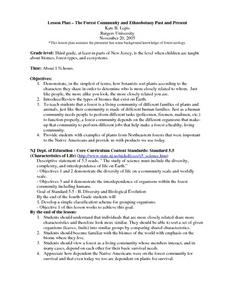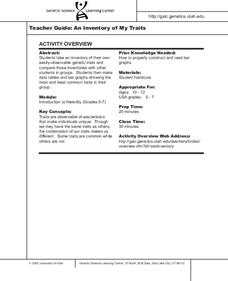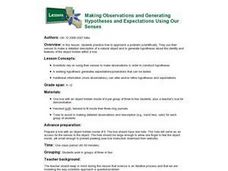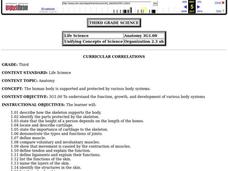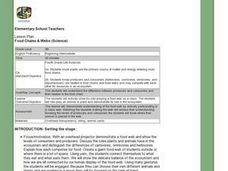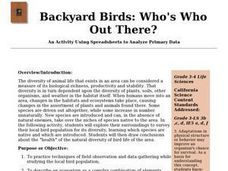Curated OER
Parts of the Plants
Second graders discuss as a class what they know about plants viewing several pictures of plants as well as a tree poster. They work in groups to observe a flowering plant which is removed from a pot with the soil brushed away and is...
Curated OER
Bats About Stellaluna
Students, after listening to Janelle Cannon's picture book Stellaluna, explore a variety of living things through three distinct activities. They make a list of what they know and want to know about birds and bats. Orally and in writing...
Curated OER
The Forest Community And Ethnobotany Past And Present
Students describe a forest as a living community. They determine members interact, and in many cases, depend on each other for their basic survival needs. They investigate how dependent the Native Americans were on the forest...
Curated OER
Visit to Nature
Students complete a science journal which contains pages in which they can predict what they think they will see before the field trip, and also pages to write down what they actually do see during the field trip.
Curated OER
Pond Water Web
Students familiarize themselves with the common organisms that live in a pond and discover their importance in a balanced aquatic habitat as they create food webs. They also investigate how an environmental change affects the habitat as...
Curated OER
Planting Parts
Each student plants two lima beans in a plastic cup with a paper towel so they can be observed growing. The beans are misted with a spray bottle, and placed in a warm sunny area. Students view the beans each day for the next two weeks,...
Curated OER
From Eggs to Frogs
Third graders receive a small container of tapioca pudding, they are to pretend that it is frog eggs. The students pretend they are birds who see the eggs, and eat some of them. They discuss what would happen if these were really frog...
Curated OER
Classifying Objects
Fourth graders classify living things according to similarities and differences through guided and independent activities. They place objects into groups according to their characteristics and then make a collage of living things...
Curated OER
An Inventory of My Traits
Students take an inventory of their own easily-observable genetic traits and
compare those inventories with other students in groups. They then make
data tables and bar graphs showing the most and least common traits in their group.
Curated OER
The Building Blocks of Life: Cell Building
Young scholars view a short video from www.unitedstreaming.com. They then construct parts of a cell by building a model of an animal and plant cell using regular household materials.
Curated OER
Penny and Cup Game
Young scholars perform activities to discover if one eye is better than two. They test their sense of sight with both monocular and binocular vision. Students drop a penny and see if it lands in the cup of water. They rely on their sense...
Curated OER
Take an Ant to Lunch
Second graders construct a model of an ant, exemplifying that ants are insects. Students gather data create a pictograph chart to show ant food preferences. Also, 2nd graders access the Internet to explore ant eating habits.
Curated OER
Bean Sprout
Student will track the growth of his/her bean sprout with sunlight and without sunlight over the course of 3 weeks. They will enter the results into an excel data base then graph the results of both variables to make the comparison.
Curated OER
Wetlands and Saltmarshes
Students identify the different functions of a wetland system and why the system is important to the St. Mary's River ecosystem and the environment. They play a migration game and write a journal about the salt marsh periwinkle and how...
Curated OER
Making Observations and Generating Hypotheses
Young scholars practice how to approach a problem scientifically. They use their senses to make a detailed description of a natural object and to generate hypotheses about the identity and features of the object hidden within a box.
Curated OER
Skeletal System
Third graders describe and identify the parts of the skeleton and how they support the body. They observe two chicken bones that have been soaked in vinegar for 5 - 7 days. They observe the bone's appearance after it has been removed...
Curated OER
"Leaf" It in Your Yard
Students research about the process of composting. Students apply their research by creating a compost pile at school that will be maintained once or twice a month for the remainder of the school year.
Curated OER
Demonstration of Cheese-Making Enzyme Magic
Students watch a demo which is a modification of an enzyme lab which is done as a "magic show". It's primary purpose is to tickle the curiosity of the student and grab interest before discussion of enzymes. It is also used to stimulate...
Curated OER
Food Chains & Webs
Fourth graders examine roles of animals in food chain, explore roles of humans, plants, and animals in ecosystem, create their own food webs, and role play producers, consumers, and decomposers.
Curated OER
Living and Nonliving
Students use their senses to record and collect data. In How Do I Classify Things in My World?, students practice classifying objects as living or nonliving. In Is it Real Or Pretend?, students group objects as real or pretend. In What...
Curated OER
Backyard Birds: Who's Who Out There?
Students practice techniques of field observation and data-gathering while studying local bird population, describe ecosystem as complex combination of elements, which can affect or be affected by each other, and determine effects of...
Curated OER
Pet Detective WebQuest
Students take an online tour to learn about pets and their care. They click on selected Web links and answer questions about the material they encounter. They share something they learned from the WebQuest with a partner.
Curated OER
Outdoor Classroom's for the '90s Student
Students relish in experiencing an outdoor classroom. Students sign a contract stating that they will follow the rules of the outdoor classroom. Students help to keep the outdoor classroom clean and up to date with all the needed...
Curated OER
Using Team Games Tournaments
Students review the unit on evolution and natural selection by playing a card game. Students take turns drawing a card from the stack and reading the question out aloud. The reader gives an answer. The other students, in turn may pass or...




